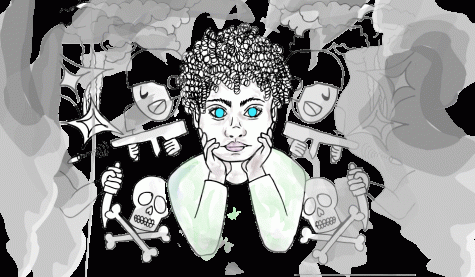It could happen here
Finding personal connections to tragic events helps combat sense of dissociation
January 12, 2016
 Emma Dietz
Emma Dietz
Sophomore Hussein Al-tmeemi fled Iraq in 2012 after an explosive took his brother’s leg and his cousin was killed during political unrest. Al-tmeemi said he finds it offensive when people lack empathy toward victims of violent events.
“When I see people and they don’t care anymore, it makes me angry because they don’t know how it is for (people affected by violence),” Al-tmeemi said, through interpreter freshman Gaidah Azem. “I have lost so many people that it actually means something to me. When I see people talking about a war and it’s nothing to them, it frustrates me.”
Stacey Kanihan, associate professor of strategic communications at the University of Minnesota, said desensitization means seeing something so many times that the emotional response disappears.
“Desensitization in the media has to do with repeated exposure — when people are seeing the same messages or images in the media they no longer have the same effect as they did at first,” Kanihan said.
Al-tmeemi said he thinks people become desensitized because they see violence as a distant issue and not something that directly affects them.
“I think people should react to violence as if it were happening right in front of them,” Al-tmeemi said. “But when you don’t see it right in front of you, you don’t get the effect that people who actually see it do.”
Heather Beschizza, adjunct professor of psychology and education at Duquesne University in Pittsburgh, said age often plays a large role in becoming desensitized.
“Teenagers’ brains are not only still developing, but they are rewiring,” Beschizza said. “If development during this time is stunted by the influences of desensitization, it can carry over into adulthood, causing long-term social issues.”
Kanihan said the personal connections someone has to an event can determine whether or not they become desensitized.
“If you ask people in north Minneapolis right now how they feel about the situation with Jamar Clark, they’re going to feel like it is more important to them than it is to people in outstate Minnesota,” Kanihan said. “Not only because it’s more newsworthy if it’s local, but also because this is a situation near and dear to their lives, their hearts and their communities.”
Beschizza said sensitivity to an event can depend on the degree of similarity between viewers and victims.
“We are more sensitive to attacks on places like Paris and it’s quite simply because they are like us,” Beschizza said. “People in the West are sympathetic to others in the West. We share a cultural and historical background.”
In regard to recent school shootings in the United States, Beschizza said she doesn’t believe students have become desensitized.
“If (students) became desensitized, they would be less likely to respond to the possible warning signs (of a shooting),” Beschizza said. “They may not think much of them due to the media coverage, but when we see students in these situations, they do react.”